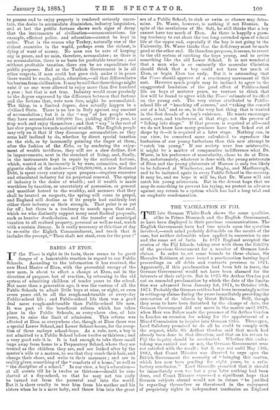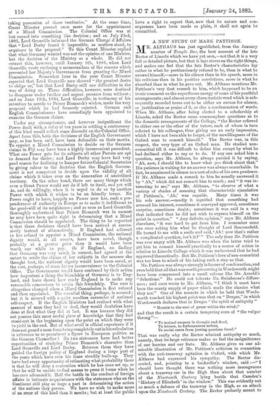THE VACILLATION IN FIJI. THE VACILLATION IN FIJI.
THE late German White-Book shows the same qualities, alike in Prince Bismarck and the English Government, as have been displayed in their previous communications. The English Government have had two minds upon the question involved,—each mind probably defensible on the merits of the case, but neither defensible when applied in succession to one and the same set of facts. In 1874 England accepted the cession of the Fiji Islands, taking over with them the liability of the previous Government for a number of German landclaims. In order to. set some bounds to these claims, Sir Hercules Robinson at once issued a proclamation barring legal proceedings on all debts and contracts previous to 1871. Apparently, if this proclamation had been left in force, the German Government would not have been alarmed for the interests of their subjects. But in 1875 Sir Arthur Gordon put out an amended proclamation by which the date of the limitation was advanced from January 1st, 1871, to October 10th, 1874. Probably the German settlers had been increasingly active in setting-up claims during the years immediately preceding the annexation of the islands by Great Britain. Still, though they seem to have been disturbed by the change of date, the German Government did not move in the matter until 1879, when Herr von Billow made the presence of Sir Arthur Gordon in London an occasion for asking for the appointment of a Mixed Commission to inquire into German title. Thereupon, Lord Salisbury promised to do all be could to comply with the request, while Sir Arthur Gordon said that much had already been done in that direction, and that on his return to Fiji the inquiry should be accelerated. Whether this undertaking was carried out or not, the German Government were not satisfied with the result ; but it was not until May 13th, 1882, that Count Miinster was directed to urge upon the British Government the necessity of "bringing this matter, which has now been pending for eight years, to a satisfactory conclusion." Lord Granville promised that it should be immediately seen to; but a year later nothing had been done, and Count Miinster expressed a significant hope that German subjects abroad would not in future "be justified in regarding themselves as threatened in the enjoyment of proprietary rights in independent territories on England
taking possession of those territories." At the same time, Count Miinster pressed once more for the appointment of a Mixed Commission. The Colonial Office was at last roused into something like decision ; and on July 23rd, 1883, Lord Granville informed the German Chargé d'Affaires that "Lord Derby found it impossible, as matters stood, to acquiesce in the proposal." To this Count Munster replied that what Germany wanted was not the opinion of one Minister, but the decision of the Ministry as a whole. He did not extract this, however, until January 9th, 1884, when Lord Granville wrote enclosing a memorandum of the reasons which prevented her Majesty's Government from granting the Mixed Commission. Somewhat later in the year Count Miinster reported that Lord Granville now showed "the greatest desire to oblige us," but that Lord Derby still saw difficulties in the way of doing so. These difficulties, however, were destined to disappear under further and urgent pressure from without ; and on June 19th, 1884, Lord Granville, in testimony of his intention to accede to Prince Bismarck's wishes, made the very proposal which he had formerly rejected. German and English Commissioners have accordingly been appointed to examine the German claims.
Under any circumstances, and however insignificant the Power dealt with, a delay of ten years in settling a controversy of this kind would reflect some discredit on the Colonial Office. Apart from this, both the decisions of the English Government may, as has been said, have been defensible on their merits.
To appoint a Mixed Commission to decide on the German claims in Fiji may have been a highly inconvenient precedent.
What one Power gets for its subjects all other Powers are apt to demand for theirs ; and Lord Derby may have had very good reason for declining to hamper future Colonial Secretaries by giving colour to the doctrine that the English Govern ment is not competent to decide upon the validity of all claims which it takes over on the annexation of uncivilised territory. On the other hand, there are many things which even a Great Power would not do if left to itself, and yet will do, and do willingly, when it is urged to do so by another Power with which it wishes to be on friendly terms. No Power ought to have, happily no Power now has, such a preponderance of authority in Europe as to make it indifferent to the good-will of its neighbours ; and as soon as Lord Granville thoroughly understood that Prince Bismarck was in earnest he may have been quite right in determining that a Mixed Commission should be appointed. The thing to be regretted is that these decisions should have been arrived at successively instead of alternatively. If England had adhered to her refusal to appoint a Mixed Commission, the national dignity would, at all events, have been saved, though probably at a greater price • than it would have been worth our while to pay. Or if England, on finding that Germany was very much in earnest, had agreed at the outset to settle the claims of her subjects in the manner she thought best, the national dignity would have been saved, at the cost, perhaps, of some future inconvenience to the Colonial Office. The Government would have confessed by their action how important a thing the friendship of Germany is to Eng land, and have shown how ready England is to make any reasonable concessions to retain this friendship. The case is altogether changed when a Mixed Commission is first refused and then appointed. The essential thing, perhaps, is secured ; but it is secured with a quite needless surrender of national self-respect. If the English Ministers had realised with what manner of man they had to deal, they would doubtless have done at first what they did at last. It was because they did not possess this most useful piece of knowledge that they had stood-out in the beginning upon the point on which they were to yield in the end. But of what avail is official experience if it does not guard a man from being completely out in his calculation in reference to so prominent a figure in European politics as the German Chancellor ? No two statesmen have had better opportunities of studying Prince Bismarck's character than Lord Granville and Lord Derby. Between them they have guided the foreign policy of England during a large part of
the years which have seen his fame steadily built-up. They have had every opportunity of estimating what probability there
is that he will drop a contention which he has once set up, or that he will be unable to find means to press it home when he has once advanced it. Half the battle in the conduct of foreign affairs is intimate acquaintance with the statesmen who on the Continent still play so large a part in determining the action of the nations they govern. We have no wish to make more of an error of this kind than it merits ; but at least the public have a right to expect that, now that its nature and consequences have been made so plain, it shall not again be committed.







































 Previous page
Previous page